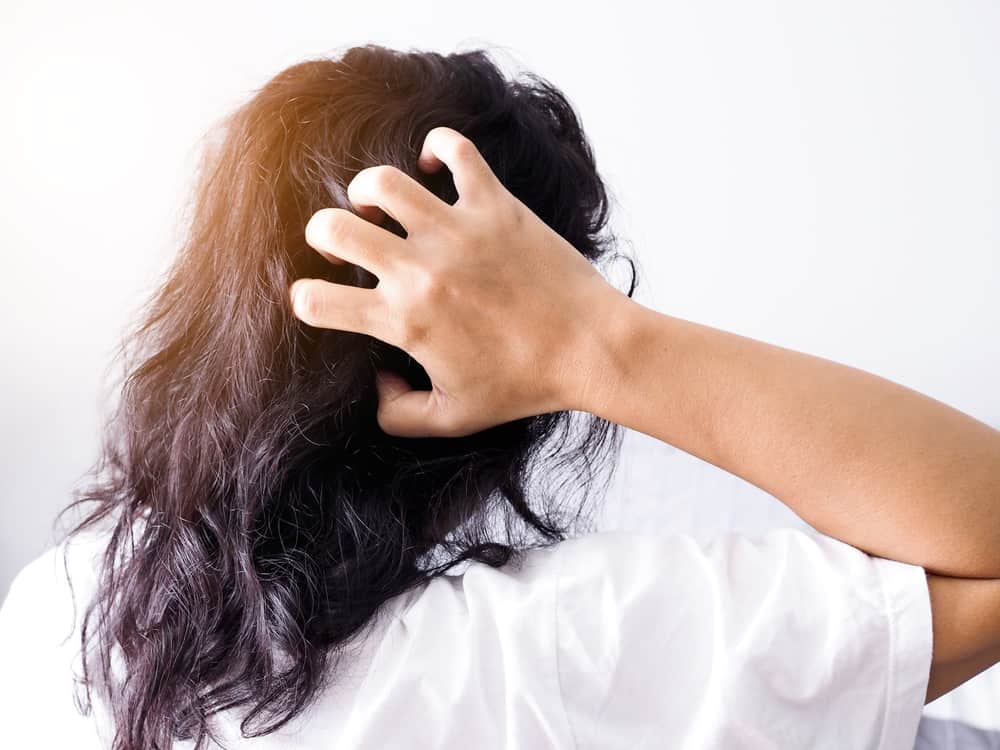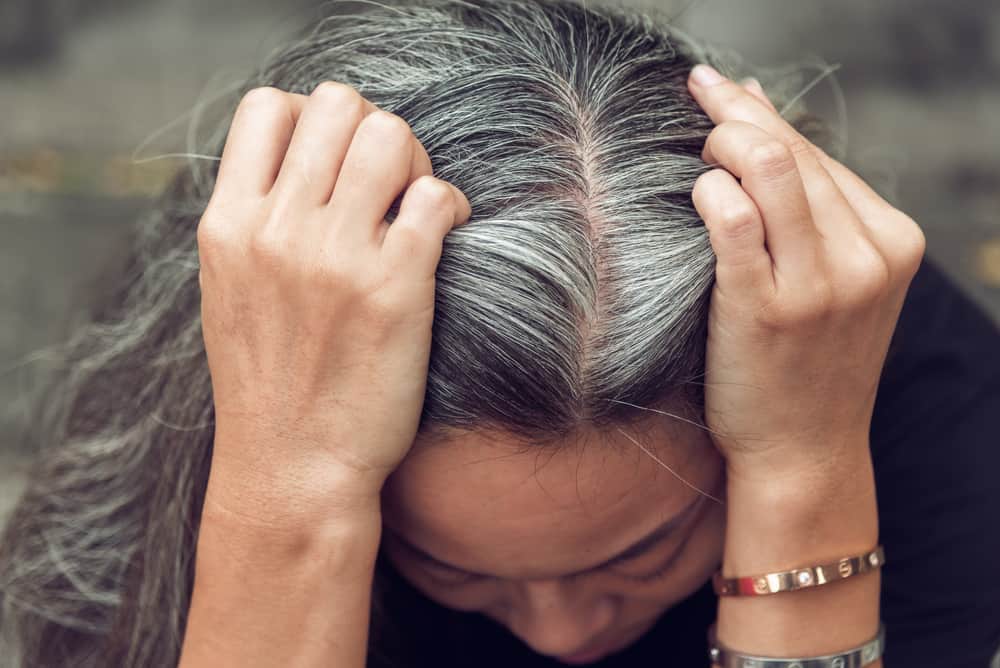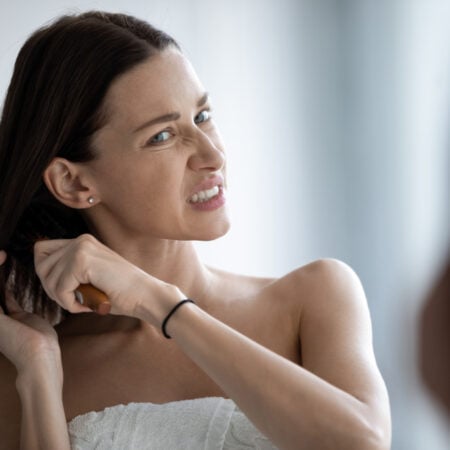Almost everybody has experienced a severe headache from time to time. However, what happens when it feels like your hair that is aching? Why does the hair itself feel as if it is pulsing, stinging or just causing you pain?
For the most part, pain felt in the hair is caused by skin conditions on the scalp, but there are exceptions. You can get all the answers you need from an expert right here, so read on and discover all you need to know.
What Causes Hair Pain?
There are several causes for scalp pain which, in turn, makes it feel as though you’re experiencing painful hair.
Failing to wash your hair enough could be causing your discomfort. If you avoid conditioning and shampooing for some time, the oils produced naturally by the scalp accumulate naturally around the hair shaft. This can promote yeast to grow excessively on the scalp, making you experience pain due to the fact that the scalp has an incredibly rich blood supply as well as lots of oil glands and nerve endings.
The yeast (known as pityrosporum) will build up, causing dandruff, which in turn causes inflammation. This then causes sensitivity, which makes you feel as if you’re experiencing pain in your hair itself. You should shampoo your hair every other day or every day if it is naturally quite oily, and every 3 – 4 days if your hair is coarse or dry to prevent these issues from occurring.
Fungal infections like tinea versicolor and tinea capitis are fairly common, especially in children. These conditions lead to scaly skin patches on the sufferer’s scalp which are sometimes circular and are sometimes known as ringworm, despite the fact that they aren’t actually anything to do with worms. Temporary loss of hair can occur due to fungal infections. Bacterial infections like boils, folliculitis and impetigo can also affect your scalp and hair.
Psoriasis and dermatitis are commonly seen skin conditions which are known to affect the scalp. Psoriasis is linked to scaly thick patches of skin whereas dermatitis causes itching and redness.
Allergies are a well-known problem for your scalp since this area is regularly exposed to many different skin products like hairspray, hair dyes, conditioners and shampoos. Symptoms of such allergies include redness, swelling and itching which can spread to the areas around the eyes and face in the most severe cases.
Neuralgia is a stabbing, sharp pain which often affects the scalp. Frequently caused by trapped nerves in the neck, these pains can be persistent and severe.
Tense arrector pili muscles can also cause scalp tenderness. These are tiny muscles located beside each hair follicle that give us goosebumps. Often believed to be related to stress, tension in these muscles is fairly common.
Tight hairstyles can cause pain and tenderness in the scalp since they may cause the hair follicles to be put under too much stress and tension. This, in turn, often leads to traction hair loss that can be permanent.
Allodynia is another reason for experiencing pain in the hair. This is something that occurs in people who suffer from headaches due to migraine and it is causes by the nerve cells inside the brain repeatedly firing. Although allodynia isn’t limited solely to the scalp, it involves increased sensitivity to pain even from stimulation that would normally not be painful, for example, from light tapping.
For this reason, many people who have migraines can experience a sensation that lightly touching their scalp, wearing a hat, or feeling the wind blowing through their hair elicits pain. Migraine medications can help to prevent allodynia from occurring.
Treating Hair Pain
The first step is to remove any obvious causes of pain. Stop using products that could trigger problems, make sure you keep your head warm during cold periods and make sure that your scalp is protected from excess wind and sun.
Avoid applying essential oils to your hair, and use a soft-bristled brush to brush your hair gently only when it’s completely dry, especially if you have a peeling or flaking scalp.
If you only experience scalp pain while suffering from a headache, you may find that these conditions are related to each other. A standard headache can usually be relieved by taking over-the-counter painkillers like ibuprofen or aspirin, and these should relieve the symptoms you’re experiencing until you find the pain has subsided.
Many mild scalp problems can be treated by washing with a medicated shampoo. Fungal infections can be eradicated and inflammation can be reduced by using shampoos that contain coal tar. If you have a very sensitive scalp, use gentle shampoos like those designed for use by children and babies.
If head lice are the cause of your irritation, comb your hair regularly using a very fine-toothed comb following a generous application of conditioner.
If folliculitis (an inflammation or infection of the hair follicles) is the source of your discomfort, you may need to use antibacterial cleansing products or even antibiotics to clear the infection up completely. You may need to visit a doctor for this, as bacterial cultures may be required to confirm your diagnosis and to obtain a prescription for the right treatment.
Should tension in your arrector pili muscles be the problem, massaging your scalp can help to relieve the discomfort. You should, however, only try this after applying a scalp or hair mask to prevent undue stress on your hair.
Cold rinsing often has adverse effects, so only wash your hair in warm water. Also, stress may be another trigger, so try to manage your stress levels effectively with relaxation techniques, breathing exercises, and yoga.
If you usually wear your hair in a tight style, switch to loose hairstyles for a while. If you’re wearing your hair up, try changing between different styles every day. Also, forgo elastic hair ties for a while, and switch to cloth ties worn in looser hairstyles so you won’t need to pull at your scalp so much. Avoid wearing your hair up while you sleep, too, as this only exacerbates the problem.
Can Hair Pain Be Prevented?
If you are experiencing hair or scalp pain, it’s sometimes evident what is causing the problem.
If you always wear your hair in corn rows, for example, and regularly experience tension around the margins of your hair, changing your hairstyle for a while could eradicate your symptoms.
It isn’t always easy to determine which is causing scalp and hair pain though. Fortunately, there are a number of things you can try to prevent the problem occurring in the future:
- Get some treatment for skin conditions like psoriasis and eczema, even if they don’t normally affect the scalp.
- Read labels on any products you plan to use on your scalp to make sure that you won’t accidentally trigger an allergic reaction.
- Brush your hair very gently and only wash it in cleansing lukewarm water on alternate days.
- Avoid using adhesive-based, sticky hair products containing alcohol since they strip moisture from your hair. Most hairsprays and gels should be avoided.
Is Hair Pain Common?

Your scalp is actually quite prone to developing pain, sensitivity, rashes and soreness that can be felt through the hair, and there are several reasons for this. Primarily, it is because it is usually covered with hair, and this can encourage the skin cells to clump together, thus trapping moisture that makes parasitic infestations and infections more likely.
Not only that, but it is also far more exposed to inclement weather and the elements when compared to the majority of your body, and this can result in damage due to wind and extreme changes in temperature.
If you’re experiencing hair loss, sunlight can also have a damaging effect on the scalp that can contribute to painful hair.
Do Different Areas Suggest a Different Cause of Pain?
If you’re experiencing soreness, especially with itching, at the back of your scalp, this could indicate that you’re suffering from a head lice infestation.
Psoriasis is a condition that may affect any area of your scalp, however, it can also extend beyond it to the forehead, neck and behind your ears.
Meanwhile, fungal infections usually affect the hair shafts and follicles as well as the eyelashes and eyebrows.
If you’re experiencing pain over your temple at the front of your scalp, you could be suffering from a serious medical inflammatory condition known as temporal arteritis. Usually, this only affects the elderly but it can cause blindness when allowed to progress unchecked. Fortunately, this is a rare condition and shouldn’t cause you any concerns unless you experience persistent pain accompanied with other symptoms like poor appetite, fatigue and double vision.
If you’re experiencing tenderness at the margins of your hair, the problem could be the way in which you’re wearing your hair as this type of pain can be down to traction.
When Is Hair Pain Experienced?
Usually, pain is experienced in the hair and scalp when you are repositioning your hair. This may either be when moving it with your fingers, when the wind blows it, or when combing and brushing. The type of pain you experience could take the form of aching, itching, tingling or burning. Some people describe their scalp pain as a pulling or scraping sensation.
Although it feels as if the hair is experiencing the pain, in fact hair strands contain no nerves. Therefore, all pain in the hair is actually coming from the scalp whenever you pull, tug or stimulate the strands of hair that are attached to it.
What if My Hair Keeps Hurting?
If you find that the problem continues to persist after taking all of the above steps, it’s time to visit your doctor or possibly a trichologist. They can give you a diagnosis and offer professional advice. You may, if necessary, be prescribed treatments like steroid lotions or antibiotics to relieve the discomfort and pain.
If you’re experiencing breakouts and scaly patches on your scalp or have any areas that are bleeding it’s especially important to visit a medical professional to get a diagnosis.
Do I Need to See a Doctor if My Hair Hurts?
It is quite common to experience pain in your hair and scalp from time to time and, as you’ve seen, there are a number of potential causes. Some of these are temporary and don’t require any treatment, however some of them do.
Tenderness in the scalp because of arrector pili muscle tension isn’t anything to worry about. It also isn’t linked to hair loss but it can feel uncomfortable, especially when combing or brushing the hair or when the wind blows and moves it.
Typically, soreness in the scalp and hair is rarely anything serious but if symptoms are experienced beyond this area, such as malaise, swelling or fever, it’s important to get medical care.
Also, if the pain and discomfort doesn’t respond when simple measures are taken to address the problem, or if they persist for more than a couple of days, it’s important to get help.
If you have scaling, burning or painful itching on your scalp, you may be suffering from a chronic skin complaint or infection and sometimes symptoms like these are linked to other conditions like hair loss disorders. This is why it’s important to consult your doctor when you experience scalp and hair pain that doesn’t go away.
Final Thoughts

Rest assured, though, that in most cases the pain you’re experiencing will subside in time without the need for any additional care or treatment. Usually, something as simple as changing your hairstyle or taking painkillers for a headache will resolve the issue and relieve the discomfort.
